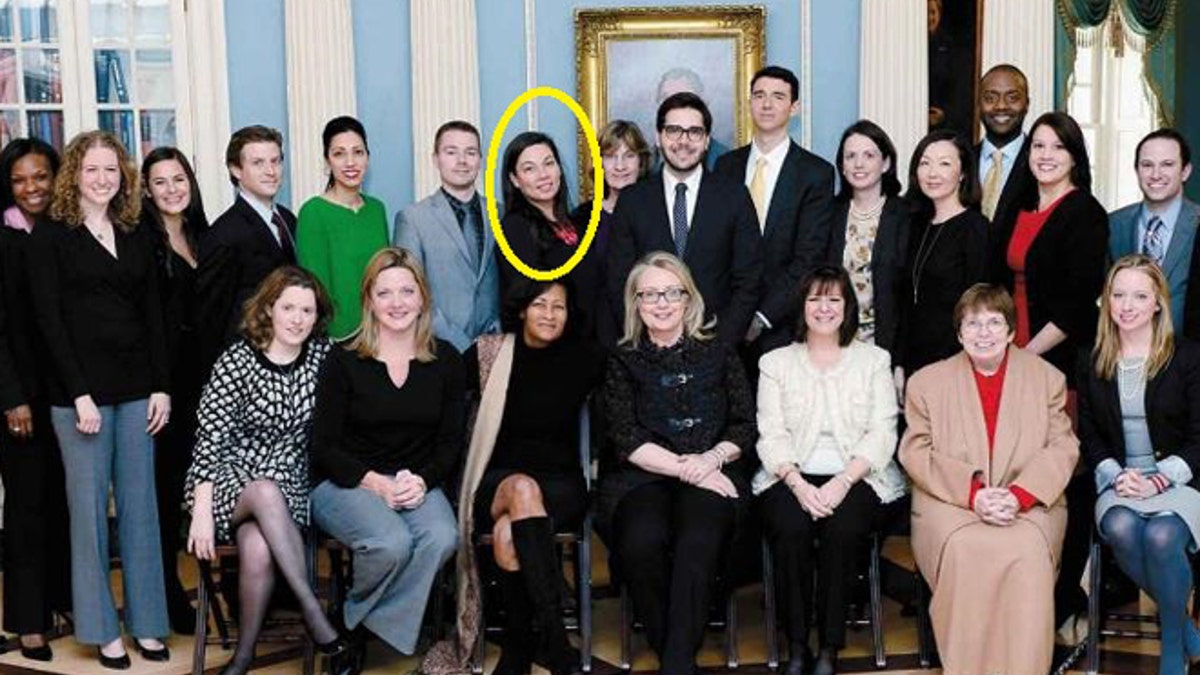
Monica Hanley, pictured standing in the back row right behind Hillary Clinton aide Cheryl Mills in a State Department photo from Clinton's book "Hard Choices." (State Department photo)
When Romanian hacker “Guccifer” breached Hillary Clinton confidant Sidney Blumenthal’s email account in 2013, it set off an explosive chain of events among a tight circle of Clinton family aides – including one “confidential assistant” whose extensive role in managing some of the former secretary’s mobile devices and computer security requests is only now becoming clear.
The details were contained in the latest document dump of FBI files on Clinton’s personal email use. The FBI chose late Friday afternoon to release nearly 200 highly redacted pages of so-called “302” files from the bureau’s investigation, a release that quickly became overshadowed by the impending presidential debate Monday.
NEW TONIGHT: 2nd FBI-Clinton document dump on a Friday this month--Continues pattern of holiday/weekend releases:https://t.co/VHtYLHAh13 pic.twitter.com/tGmsCfE44a
— Fox News Research (@FoxNewsResearch) September 24, 2016
But the files included new details of the tech intervention by Clinton aide Huma Abedin and Clinton Foundation official Justin Cooper – and a third individual, a Hillary Clinton aide named Monica Hanley.
Hanley was interviewed twice by the FBI, on Jan. 11 and June 23. Working for Hillary Clinton as a “confidential assistant,” Hanley joined the State Department in 2009 as Hillary Clinton began her job as secretary of state. Previously, the 35-year-old worked as an intern for Clinton while she served as a U.S. senator for New York.
In the released documents, Hanley emerged as the go-to staffer often tasked with finding replacements to satisfy Clinton’s chosen use of non-secure BlackBerries. Hanley stated she tried to find BlackBerries for sale on eBay and admitted that she made a trip to a mall in Virginia to try to find devices for sale.
Hanley noted a “coffee incident” ruined one of the Clinton’s devices.
In her interviews, Hanley told the FBI that during her time at the State Department, she learned “specifically how to handle and transport classified information/paper but could not recall who provided the training.”
Two emails from Hanley were marked classified with a c for “confidential,” the lowest level of classification. Fox News first reported some of the emails contained classified markings despite Clinton’s public claims.
The FBI document said “Hanley received a Top Secret/SCI clearance at DoS.” Despite the training, during one trip to Russia, Hanley was specifically criticized for leaving a classified document in a hotel suite she shared with Clinton during the trip. “Hanley was informed by DS (Department of State) that the briefing book and document should have never been in the suite,” the document said.
She was also involved in the response to the hack by Guccifer, whose real name is Marcel Lehel Lazar.
It was during her second interview with the FBI on June 23 that Hanley finally revealed details of a conference call she had with Abedin and top Clinton Foundation fundraiser Cooper as they scrambled “over concerns related to a reported hack by Sidney Blumenthal’s email account” in the spring of 2013, first reported by The Smoking Gun.
In the latest documents, the FBI redacted another individual’s name who apparently was on that conference call.
Cooper, who recently testified before the House oversight committee, was responsible for running the clintonemail.com networks. In addition to his work for the Clinton Foundation, Cooper is listed as a senior adviser to Teneo Holdings, a private investment banking firm worth billions and founded by former President Bill Clinton and longtime adviser Doug Band.
The FBI file says Hanley told the FBI that after the conference call, “Cooper provided Hanley an Apple Mac laptop from the Clinton Foundation, which Hanley took home to her apartment (redacted.) It was noted that “Hanley created an archive of Hillary R. Clinton’s hdr22@clintonemail.com as a result of concerns about the reported hack of Blumenthal’s account.
Hanley stated that Abedin selected the new name of the email account, hrod17@clintonemail.com.
In her Jan. 11 statement to the FBI, Hanley initially said the computer given to her by Cooper was a MacAir and that it “took several days” for the transfer of emails to the laptop to be performed in her apartment. Hanley also testified in January that she “recalled transferring the emails to a thumb-drive but could not recall what happened to the thumb-drive.”
However, in her June 23 interview, Hanley changed her statement to say the computer was “likely a Pro (MacPro) because it had an ethernet port and a thumb drive portal.”
In addition, Hanley added that “she thought she might have given the thumb drive to Abedin” when she transitioned to (Redacted) as she provided Abedin with several items.
And in that second interview, Hanley suddenly remembered that the Clinton Foundation laptop given to her by Cooper to archive the secretary’s emails was still in her possession in 2014 “after she was not working for Clinton.”
Hanley stated that she contacted Platte River Networks (PRN) on her own accord and spoke with (redacted.) That computer was never recovered by the FBI.
Unlike Cooper at the recent House hearing, Paul Combetta of Platte River Networks took the Fifth in refusing to answer questions regarding his use of “Bleachbit” to scrub Clinton’s email headers in March 2015 despite a congressional order to preserve the records.
The FBI formally concluded that Lazar did not get into Clinton’s private servers but assessed that other bad actors including Russia and Ukraine used “brute” force to launch cyberattacks again her networks immediately after Lazar’s breach of Blumenthal’s AOL account.












































